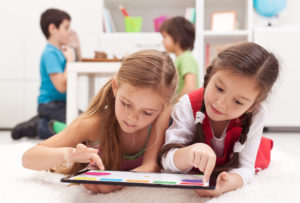The hectic pace of daily life can pull family members in many different directions, leaving little time for real connection and communication.
This can strain relationships and cause family members to be like ships passing in the night, even when they all live together. Fast paced schedules can also take a toll on eating habits and physical health, with little time given to planning or eating healthy meals for parents and children alike.
Feeding the family becomes an after-thought that is sandwiched between all the other responsibilities and tasks to be done during the day. We may catch food on the run at the drive through; microwave something on the way out the door; or eat in shifts as people come and go from various activities. These eating patterns can take a negative toll on not only our physical and mental health, but also our relationships.
Given that we generally eat 3 meals a day, mealtimes can be an excellent opportunity for families to slow down and share time together in a meaningful way. Bringing mindfulness to our mealtimes provides opportunities to connect as a family, and nourish our bodies and minds in healthy ways. Even if just one meal per day is shared and approached mindfully, this has both immediate and lasting benefits for parents and children. Eating together as a family strengthens relationships, promotes communication, fosters healthy eating habits, and reduces family stress.
Here are some specific ways to approach family meals more mindfully:
1) Slow down
- Set aside the hectic pace that can be the norm in our days, and take time to actually see and hear one another. This allows our children to know that they matter and have our full attention. It also allows us to relax, breathe, and enjoy the food and company without feeling rushed.
- Plan family meals for times that work for everyone to participate. This may not be possible seven days a week, but should happen as often as possible. Plan ahead to ensure you have time to prepare the meal and eat together.
- As people finish eating, continue to sit together at the table to enjoy each other’s company and converse until everyone is finished.
When we slow down at meals, we teach children that meals are about more than just putting food in our mouths. Eating together is about relationships, savoring and enjoying our food, and being mindful of the process.
2) Prepare the meal and engage in meal routines together
- Plan recipes and make food choices together whenever possible. This exposes children to the ingredients, and may help avoid complaints/pickiness about what is being served.
- Include children in making food. This teaches children valuable cooking skills, and allows us to spend more time together.
- Work together to set the table, clean up, and engaged in other meal-related tasks. This fosters togetherness and teaches children important life skills. It also helps them become mindful of everything that goes into meals beyond just sitting down to eat.
3) Meals are device-free zones
- Prevent distractions by putting away electronic devices. This allows everyone to focus on each other and the food being eaten, rather than what might be happening on social media, texts, or the phone.
- Turning off devices during mealtimes promotes stress reduction, which increases positive emotions and better digestion of food.
- This rule also encourages mindfulness about the food and the process of eating. Children need adults to model disconnecting from their devices in order to more fully experience what is happening in the present moment.
4) Communicate
- Take a moment to express thankfulness for the meal. Saying grace or going around the table to share something each family member is thankful for are two options. Figure out a gratefulness routine that works for your family.
- Talk about specific aspects of the food you are eating: where it came from, what else you might make with it, preferences or changes you might make the next time, etc.
- Discuss qualities of the foods you are eating – describe the tastes, textures, etc. This helps children become familiar with a broader range of foods and expands their palates, and is especially important for children who are picky eaters
- Talk about how you feel before and after eating. Statements such as, “I’m really hungry”, “I feel so full I’m not going to have anymore”, etc. help children and parents tune into how they feel, what they are eating, and how much they are eating.
5) Have fun
- Create contests to encourage mindfulness about the meal. See who can crunch their carrot the loudest. Close your eyes and try to guess what someone else is eating based on their description.
- Encourage learning through food-related trivia. Where is this food grown? What vitamin/nutrients are in this food?
- Compare and contrast the number of chews it takes to eat a bite of different foods.
Mindful eating practices support physical, mental, and relational health. These strategies provide some simple starting points for encouraging mindful eating in your children and family as whole. Teaching children to slow down, participate in meal preparation, engage in communication, be in relationship with one another, and have fun in the process helps set them up for a lifetime of healthy attitudes and habits around food.
If you have tried these or other mindful meal strategies in your family, I’d love to hear about them. Post your ideas in the comments so we can all benefit!
What You Should Do Next:
Sign up for my Better Behavior Naturally community newsletter
Sign up for my newsletter to get tips, resources, and supports to improve your child’s attention, anxiety, mood, and behavior…while making your job as a parent easier.
Enroll in one of my workshops
Check out one of my many workshops where you’ll join my exclusive community of parents in a one-of-a-kind virtual resource accessible 24/7. Whether you’ve got a child with a diagnosis like autism or ADHD, or are becoming more and more frustrated with a child who struggles to listen and cope, these workshops are designed to give you the information, tools, and support you need…whenever you need it.








